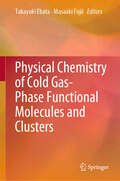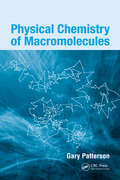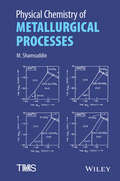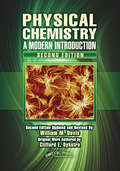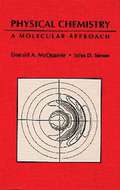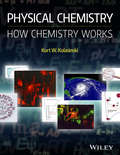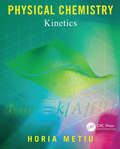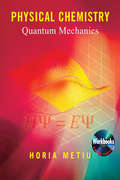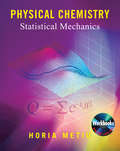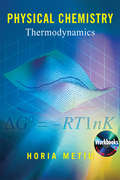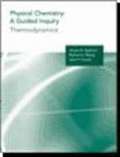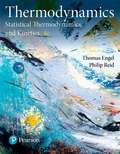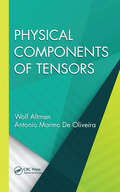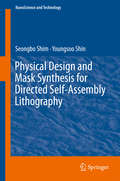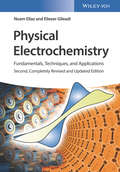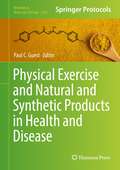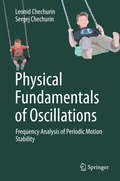- Table View
- List View
Physical Chemistry of Cold Gas-Phase Functional Molecules and Clusters
by Takayuki Ebata Masaaki FujiiThis book describes advanced research on the structures and photochemical properties of polyatomic molecules and molecular clusters having various functionalities under cold gas-phase conditions. Target molecules are crown ethers, polypeptides, large size protonated clusters, metal clusters, and other complex polyatomic molecules of special interest. A variety of advanced frequency and time-domain laser spectroscopic methods are applied. The book begins with the principle of an experimental setup for cold gas-phase molecules and various laser spectroscopic methods, followed by chapters on investigation of specific molecular systems. Through a molecular-level approach and analysis by quantum chemical calculation, it is possible to learn how atomic and molecular-level interactions (van der Waals, hydrogen-bonding, and others) control the specific properties of molecules and clusters. Those properties include molecular recognition, induced fitting, chirality, proton and hydrogen transfer, isomerization, and catalytic reaction. The information will be applicable to the design of new types of functional molecules and nanoparticles in the broad area that includes applied chemistry, drug delivery systems, and catalysts.
Physical Chemistry of Ionic Materials: Ions and Electrons in Solids
by Joachim MaierDiscover the physical chemistry of charge carriers in the second edition of this popular textbook Ionic and electronic charge carriers are critical to the kinetic and electrochemical properties of ionic solids. These charge carriers are point defects and are decisive for electrical conductivity, mass transport, and storage phenomena. Generally, defects are deviations from the perfect structure, and if higher-dimensional, also crucial for the mechanical properties. The study of materials science and energy research therefore requires a thorough understanding of defects, in particular the charged point defects, their mobilities, and formation mechanisms. Physical Chemistry of Ionic Materials is a comprehensive introduction to these charge carrier particles and the processes that produce, move, and activate them. Covering both core principles and practical applications, it discusses subjects ranging from chemical bonding and thermodynamics to solid-state kinetics and electrochemical techniques. Now in an updated edition with numerous added features, it promises to be the essential textbook on this subject for a new generation of materials scientists. Readers of the 2nd Edition of Physical Chemistry of Ionic Materials will also find: Two new chapters on solid state electrochemistry and another on nanoionics Novel brief sections on photoelectrochemistry, bioelectrochemistry, and atomistic modelling put the treatment into a broader context Discussion of the working principles required to understand electrochemical devices like sensors, batteries, and fuel cells Real laboratory measurements to ground basic principles in practical experimentation Physical Chemistry of Ionic Materials is a valuable reference for chemists, physicists, and any working researchers or advanced students in the materials sciences.
Physical Chemistry of Macromolecules
by Gary PattersonWritten by a chemical physicist specializing in macromolecular physics, this book brings to life the definitive work of celebrated scientists who combined multidisciplinary perspectives to pioneer the field of polymer science. The author relates firsthand the unique environment that fostered the experimental breakthroughs underlying some of today's
Physical Chemistry of Metallurgical Processes
by M. ShamsuddinThis book covers various metallurgical topics, viz. roasting of sulfide minerals, matte smelting, slag, reduction of oxides and reduction smelting, interfacial phenomena, steelmaking, secondary steelmaking, role of halides in extraction of metals, refining, hydrometallurgy and electrometallurgy. Each chapter is illustrated with appropriate examples of applications of the technique in extraction of some common, reactive, rare or refractory metal together with worked out problems explaining the principle of the operation.
Physical Chemistry of Metallurgical Processes, Second Edition (The Minerals, Metals & Materials Series)
by Mohammad ShamsuddinThis updated, second edition retains its classroom-tested treatment of physical chemistry of metallurgical topics, such as roasting of sulfide minerals, matte smelting, converting, structure, properties and theories of slag, reduction of oxides and reduction smelting, interfacial phenomena, steelmaking, secondary steelmaking, role of halides in extraction of metals, refining, hydrometallurgy and electrometallurgy, and adds new data in worked-out examples as well as up-to-date references to the literature. The book further explains the physical chemistry of various metallurgical topics, steps involved in extraction of metals, such as roasting, matte smelting/converting, reduction smelting, steelmaking reactions, deoxidation, stainless steelmaking, vacuum degassing, refining, leaching, chemical precipitation, ion exchange, solvent extraction, cementation, gaseous reduction and electrowinning. Each topic is illustrated with appropriate examples of applications of the technique in extraction of some common, reactive, rare, or refractory metal together with worked out problems explaining the principle of the operation. The problems require imagination and critical analyses and also encourage readers for creative application of thermodynamic data in metal extraction.Updates and condenses text throughout the book by sequential arrangement of paragraphs in different chapters;Maximizes readers’ understanding of the physicochemical principles involved in extraction/production of common and rare/reactive metals by pyro- as well as hydrometallurgical routes;Reinforces concepts presented with worked examples in each chapter explaining the process steps;Explains the physical chemistry of various metallurgical steps, such as roasting, matte smelting/converting, and reduction smelting, steelmaking, aqueous processing etc. in extraction of metals;Collects and uniformly presents scattered information on physicochemical principles of metal production from various books and journals.
Physical Chemistry of Semiconductor Materials and Processes
by Sergio PizziniThe development of semiconductor devices began a little more than a century ago, with the discovery of the electrical conductivity of ionic solids. Today, solid state technologies form the background of the society in which we live. The aim of this book is threefold: to present the background physical chemistry on which the technology of solid state devices is based; secondly, to describe specific issues such as the role of defects on the properties of solids, and the crucial influence of surface properties; and ultimately, to look at the physics and chemistry of growth processes, both at the bulk and thin-film level, together with some issues relating to the properties of nano-devices. Divided into five chapters, it covers: Thermodynamics of solids, including phases and their properties and structural order Point defects in semiconductors Extended defects in semiconductors and their interactions with point defects and impurities Growth of semiconductor materials Physical chemistry of semiconductor materials processing With applications across all solid state technologies,the book is useful for advanced students and researchers in materials science, physics, chemistry, electrical and electronic engineering. It is also useful for those in the semiconductor industry.
Physical Chemistry: A Modern Introduction, Second Edition
by William M. DavisDesigned specifically for a two-semester introductory course sequence in physical chemistry, this text presents core principles and topics. Straightforward and streamlined, it presents the necessary amount of detail for comprehension. Organized in such a way that the various topics covered are connected to each other, it allows students to see physical chemistry as an interconnected discipline and not a series of unrelated concepts. Each chapter in this new edition has been thoroughly updated and includes new information on computational applications, more end-of-chapter problems, and new chapters on nanotechnology and surface chemistry
Physical Chemistry: A Molecular Approach
by Donald A. Mcquarrie John D. SimonThis book provides a contemporary approach to the study of physical chemistry. By beginning with quantum chemistry, students will learn the fundamental principles upon which all modern physical chemistry is built.
Physical Chemistry: How Chemistry Works
by Kurt W. KolasinskiMuch of chemistry is motivated by asking 'How'? How do I make a primary alcohol? React a Grignard reagent with formaldehyde. Physical chemistry is motivated by asking 'Why'? The Grignard reagent and formaldehyde follow a molecular dance known as a reaction mechanism in which stronger bonds are made at the expense of weaker bonds. If you are interested in asking 'why' and not just 'how', then you need to understand physical chemistry. Physical Chemistry: How Chemistry Works takes a fresh approach to teaching in physical chemistry. This modern textbook is designed to excite and engage undergraduate chemistry students and prepare them for how they will employ physical chemistry in real life. The student-friendly approach and practical, contemporary examples facilitate an understanding of the physical chemical aspects of any system, allowing students of inorganic chemistry, organic chemistry, analytical chemistry and biochemistry to be fluent in the essentials of physical chemistry in order to understand synthesis, intermolecular interactions and materials properties. For students who are deeply interested in the subject of physical chemistry, the textbook facilitates further study by connecting them to the frontiers of research. * Provides students with the physical and mathematical machinery to understand the physical chemical aspects of any system.* Integrates regular examples drawn from the literature, from contemporary issues and research, to engage students with relevant and illustrative details.* Important topics are introduced and returned to in later chapters: key concepts are reinforced and discussed in more depth as students acquire more tools. * Chapters begin with a preview of important concepts and conclude with a summary of important equations.* Each chapter includes worked examples and exercises: discussion questions, simple equation manipulation questions, and problem-solving exercises. * Accompanied by supplementary online material: worked examples for students and a solutions manual for instructors.* Written by an experienced instructor, researcher and author in physical chemistry, with a voice and perspective that is pedagogical and engaging.
Physical Chemistry: Kinetics
by Horia MetiuThis is a new undergraduate textbook on physical chemistry by Horia Metiu published as four separate paperback volumes. These four volumes on physical chemistry combine a clear and thorough presentation of the theoretical and mathematical aspects of the subject with examples and applications drawn from current industrial and academic research. By using the computer to solve problems that include actual experimental data, the author is able to cover the subject matter at a practical level. The books closely integrate the theoretical chemistry being taught with industrial and laboratory practice. This approach enables the student to compare theoretical projections with experimental results, thereby providing a realistic grounding for future practicing chemists and engineers. Each volume of Physical Chemistry includes Mathematica® and Mathcad® Workbooks on downloadable resources.Metiu's four separate volumes-Thermodynamics, Statistical Mechanics, Kinetics, and Quantum Mechanics-offer built-in flexibility by allowing the subject to be covered in any order.These textbooks can be used to teach physical chemistry without a computer, but the experience is enriched substantially for those students who do learn how to read and write Mathematica® or Mathcad® programs. A TI-89 scientific calculator can be used to solve most of the exercises and problems.® Mathematica is a registered trademark of Wolfram Research, Inc.® Mathcad is a registered trademark of Mathsoft Engineering & Education, Inc.
Physical Chemistry: Quantum Mechanics
by Horia MetiuThis is a new undergraduate textbook on physical chemistry by Horia Metiu published as four separate paperback volumes. These four volumes on physical chemistry combine a clear and thorough presentation of the theoretical and mathematical aspects of the subject with examples and applications drawn from current industrial and academic research. By using the computer to solve problems that include actual experimental data, the author is able to cover the subject matter at a practical level. The books closely integrate the theoretical chemistry being taught with industrial and laboratory practice. This approach enables the student to compare theoretical projections with experimental results, thereby providing a realistic grounding for future practicing chemists and engineers. Each volume of Physical Chemistry includes Mathematica® and Mathcad® Workbooks on downloadable resources.Metiu's four separate volumes-Thermodynamics, Statistical Mechanics, Kinetics, and Quantum Mechanics-offer built-in flexibility by allowing the subject to be covered in any order.These textbooks can be used to teach physical chemistry without a computer, but the experience is enriched substantially for those students who do learn how to read and write Mathematica® or Mathcad® programs. A TI-89 scientific calculator can be used to solve most of the exercises and problems.® Mathematica is a registered trademark of Wolfram Research, Inc.® Mathcad is a registered trademark of Mathsoft Engineering & Education, Inc.
Physical Chemistry: Statistical Mechanics
by Horia MetiuThis is a new undergraduate textbook on physical chemistry by Horia Metiu published as four separate paperback volumes. These four volumes on physical chemistry combine a clear and thorough presentation of the theoretical and mathematical aspects of the subject with examples and applications drawn from current industrial and academic research. By using the computer to solve problems that include actual experimental data, the author is able to cover the subject matter at a practical level. The books closely integrate the theoretical chemistry being taught with industrial and laboratory practice. This approach enables the student to compare theoretical projections with experimental results, thereby providing a realistic grounding for future practicing chemists and engineers. Each volume of Physical Chemistry includes Mathematica® and Mathcad® Workbooks on downloadable resources.Metiu's four separate volumes-Thermodynamics, Statistical Mechanics, Kinetics, and Quantum Mechanics-offer built-in flexibility by allowing the subject to be covered in any order.These textbooks can be used to teach physical chemistry without a computer, but the experience is enriched substantially for those students who do learn how to read and write Mathematica® or Mathcad® programs. A TI-89 scientific calculator can be used to solve most of the exercises and problems.® Mathematica is a registered trademark of Wolfram Research, Inc.® Mathcad is a registered trademark of Mathsoft Engineering Education, Inc.
Physical Chemistry: Thermodynamics
by Horia MetiuThis is a new undergraduate textbook on physical chemistry by Horia Metiu published as four separate paperback volumes. These four volumes on physical chemistry combine a clear and thorough presentation of the theoretical and mathematical aspects of the subject with examples and applications drawn from current industrial and academic research. By using the computer to solve problems that include actual experimental data, the author is able to cover the subject matter at a practical level. The books closely integrate the theoretical chemistry being taught with industrial and laboratory practice. This approach enables the student to compare theoretical projections with experimental results, thereby providing a realistic grounding for future practicing chemists and engineers. Each volume of Physical Chemistry includes Mathematica® and Mathcad® Workbooks on downloadable resources.Metiu's four separate volumes-Thermodynamics, Statistical Mechanics, Kinetics, and Quantum Mechanics-offer built-in flexibility by allowing the subject to be covered in any order.These textbooks can be used to teach physical chemistry without a computer, but the experience is enriched substantially for those students who do learn how to read and write Mathematica® or Mathcad® programs. A TI-89 scientific calculator can be used to solve most of the exercises and problems.® Mathematica is a registered trademark of Wolfram Research, Inc.® Mathcad is a registered trademark of Mathsoft Engineering & Education, Inc.
Physical Chemistry: Thermodynamics
by James N. Spencer Richard S. Moog John J. FarrellDesigned to encourage active and collaborative learning in the physical chemistry classroom, this text is a collection of group activities (ChemActivities) that can accompany any physical chemistry text.
Physical Chemistry: Thermodynamics, Statistical Thermodynamics, and Kinetics
by Thomas Engel Philip ReidEngel and Reid’s Thermodynamics, Statistical Thermodynamics, and Kinetics provides a contemporary, conceptual, and visual introduction to physical chemistry. The authors emphasize the vibrancy of physical chemistry today and illustrate its relevance to the world around us, using modern applications drawn from biology, environmental science, and material science. The 4th Edition provides visual summaries of important concepts and connections in each chapter, offers students “just-in-time” math help, and expands content to cover science relevant to physical chemistry. Tutorials in Mastering™ Chemistry reinforce students’ understanding of complex theory in Quantum Chemistry and Thermodynamics as they build problem-solving skills throughout the course.
Physical Components of Tensors (Applied and Computational Mechanics)
by Wolf Altman Antonio Marmo OliveiraIllustrating the important aspects of tensor calculus, and highlighting its most practical features, Physical Components of Tensors presents an authoritative and complete explanation of tensor calculus that is based on transformations of bases of vector spaces rather than on transformations of coordinates. Written with graduate students, professors, and researchers in the areas of elasticity and shell theories in mind, this text focuses on the physical and nonholonomic components of tensors and applies them to the theories. It establishes a theory of physical and anholonomic components of tensors and applies the theory of dimensional analysis to tensors and (anholonomic) connections. This theory shows the relationship and compatibility among several existing definitions of physical components of tensors when referred to nonorthogonal coordinates. The book assumes a basic knowledge of linear algebra and elementary calculus, but revisits these subjects and introduces the mathematical backgrounds for the theory in the first three chapters. In addition, all field equations are also given in physical components as well.Comprised of five chapters, this noteworthy text: Deals with the basic concepts of linear algebra, introducing the vector spaces and the further structures imposed on them by the notions of inner products, norms, and metrics Focuses on the main algebraic operations for vectors and tensors and also on the notions of duality, tensor products, and component representation of tensors Presents the classical tensor calculus that functions as the advanced prerequisite for the development of subsequent chapters Provides the theory of physical and anholonomic components of tensors by associating them to the spaces of linear transformations and of tensor products and advances two applications of this theory Physical Components of Tensors contains a comprehensive account of tensor calculus, and is an essential reference for graduate students or engineers concerned with solid and structural mechanics.
Physical Design and Mask Synthesis for Directed Self-Assembly Lithography (NanoScience and Technology)
by Youngsoo Shin Seongbo ShimThis book discusses physical design and mask synthesis of directed self-assembly lithography (DSAL). It covers the basic background of DSAL technology, physical design optimizations such as placement and redundant via insertion, and DSAL mask synthesis as well as its verification. Directed self-assembly lithography (DSAL) is a highly promising patterning solution in sub-7nm technology.
Physical Electrochemistry: Fundamentals, Techniques, and Applications
by Noam Eliaz Eliezer GileadiThis bestselling textbook on physical electrochemistry caters to the needs of advanced undergraduate and postgraduate students of chemistry, materials engineering, mechanical engineering, and chemical engineering. It is unique in covering both the more fundamental, physical aspects as well as the application-oriented practical aspects in a balanced manner. In addition it serves as a self-study text for scientists in industry and research institutions working in related fields. The book can be divided into three parts: (i) the fundamentals of electrochemistry; (ii) the most important electrochemical measurement techniques; and (iii) applications of electrochemistry in materials science and engineering, nanoscience and nanotechnology, and industry. The second edition has been thoroughly revised, extended and updated to reflect the state-of-the-art in the field, for example, electrochemical printing, batteries, fuels cells, supercapacitors, and hydrogen storage.
Physical Exercise and Natural and Synthetic Products in Health and Disease (Methods in Molecular Biology #2343)
by Paul C. GuestThis detailed book explores protocols with the aim of testing aerobic exercise, resistance training, special diets, additives and natural products, which have led to new insights into the physiological and molecular aspects of health and disease. Many of these approaches have contributed to significant improvements in disease areas such as cardiovascular disease, cognitive dysfunction, diabetes, frailty, gliobastoma, metabolic syndrome, obesity, oxidative stress, and various cancers. This collection also provides important information on disease mechanisms and novel drug targets as each protocol is presented in the context of specific chronic diseases or different therapeutic areas. Written for the highly successful Methods in Molecular Biology series, chapters include introductions to their respective topics, lists of the necessary materials, step-by-step, readily reproducible protocols, and tips on troubleshooting and avoiding known pitfalls. Authoritative and reflective of research from all around the globe, Physical Exercise and Natural and Synthetic Products in Health and Disease serves as an ideal guide for researchers in the areas of chronic disease, exercise, and nutrition, as well as to clinical scientists, physicians, and pharmacologists as it gives insights into possibilities for the development of novel therapeutics and the means of monitoring therapeutic response through the measurement of molecular and physiometric biomarkers.
Physical Foundations of Continuum Mechanics
by A. Ian MurdochIan Murdoch's Physical Foundations of Continuum Mechanics will interest engineers, mathematicians, and physicists who study the macroscopic behaviour of solids and fluids or engage in molecular dynamical simulations. In contrast to standard works on the subject, Murdoch's book examines physical assumptions implicit in continuum modelling from a molecular perspective. In so doing, physical interpretations of concepts and fields are clarified by emphasising both their microscopic origin and sensitivity to scales of length and time. Murdoch expertly applies this approach to theories of mixtures, generalised continua, fluid flow through porous media, and systems whose molecular content changes with time. Elements of statistical mechanics are included, for comparison, and two extensive appendices address relevant mathematical concepts and results. This unique and thorough work is an authoritative reference for both students and experts in the field.
Physical Foundations of Cosmology
by Viatcheslav MukhanovInflationary cosmology has been developed over the last twenty years to remedy serious shortcomings in the standard hot big bang model of the universe. Taking an original approach, this textbook explains the basis of modern cosmology and shows where the theoretical results come from. The book is divided into two parts; the first deals with the homogeneous and isotropic model of the Universe, the second part discusses how inhomogeneities can explain its structure. Established material such as the inflation and quantum cosmological perturbation are presented in great detail.
Physical Fundamentals of Oscillations: Frequency Analysis Of Periodic Motion Stability
by Leonid Chechurin Sergej ChechurinThe book introduces possibly the most compact, simple and physically understandable tool that can describe, explain, predict and design the widest set of phenomena in time-variant and nonlinear oscillations. The phenomena described include parametric resonances, combined resonances, instability of forced oscillations, synchronization, distributed parameter oscillation and flatter, parametric oscillation control, robustness of oscillations and many others. Although the realm of nonlinear oscillations is enormous, the book relies on the concept of minimum knowledge for maximum understanding. This unique tool is the method of stationarization, or one frequency approximation of parametric resonance problem analysis in linear time-variant dynamic systems. The book shows how this can explain periodic motion stability in stationary nonlinear dynamic systems, and reveals the link between the harmonic stationarization coefficients and describing functions. As such, the book speaks the language of control: transfer functions, frequency response, Nyquist plot, stability margins, etc. An understanding of the physics of stability loss is the basis for the design of new oscillation control methods for, several of which are presented in the book. These and all the other findings are illustrated by numerical examples, which can be easily reproduced by readers equipped with a basic simulation package like MATLAB with Simulink. The book offers a simple tool for all those travelling through the world of oscillations, helping them discover its hidden beauty. Researchers can use the method to uncover unknown aspects, and as a reference to compare it with other, for example, abstract mathematical means. Further, it provides engineers with a minimalistic but powerful instrument based on physically measurable variables to analyze and design oscillatory systems.
Physical Gels from Biological and Synthetic Polymers
by Madeleine Djabourov Katsuyoshi Nishinari Simon B. Ross-Murphy Madeleine Djabourov Katsuyoshi NishinariPresenting a unique perspective on state-of-the-art physical gels, this interdisciplinary guide provides a complete, critical analysis of the field and highlights recent developments. It shows the interconnections between the key aspects of gels, from molecules and structure through to rheological and functional properties, with each chapter focusing on a different class of gel. There is also a final chapter covering innovative systems and applications, providing the information needed to understand current and future practical applications of gels in the pharmaceutical, agricultural, cosmetic, chemical and food industries. Many research teams are involved in the field of gels, including theoreticians, experimentalists and chemical engineers, but this interdisciplinary book collates and rationalises the many different points of view to provide a clear understanding of these complex systems for researchers and graduate students.
Physical Geology (12th Edition)
by Charles C. Plummer Diane H. CarlsonOne excellent reason to read this book is that it's tried and true. Since the book was published in 1979, over 1,000,000 students have read this text as an introduction to physical geology. Proportionately, geology instructors have relied on this text for over 5,000 courses to explain, illustrate, and exemplify basic geologic concepts to both majors and non-majors. Today, the 12th edition continues to provide contemporary perspectives that reflect current research, recent natural disasters, unmatched illustrations, and unparalleled learning aids. We have worked closely with contributors, reviewers, and our editors to publish the most accurate and current text possible.
Physical Geology: Earth Revealed, Ninth Edition
by Charles C. Plummer Diane H. Carlson Lisa HammersleyThe ninth edition has been updated to include the most current information from the various sub-disciplines that comprise physical geology. The book's purpose is to clearly present geologic processes so that students can understand the logic of scientific methods. This text features an outstanding art program and a proven, accessible writing style.
